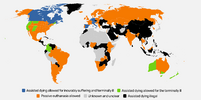You are using an out of date browser. It may not display this or other websites correctly.
You should upgrade or use an alternative browser.
You should upgrade or use an alternative browser.
Serious doubts
- Thread starter Dr Love
- Start date
It will be murder
KIARA
Broken
Sucide frm ur side murder from d person who kill uIf u hire somebody to kill u.... will it be consider as suicide or muder..?
View attachment 93421
Euthanasia and assisted suicide
Assisted suicide is the act of deliberately assisting another person to kill themselvesBoth euthanasia and assisted suicide are illegal
Assisted suicide
Assisted suicide is illegal under the terms of the Suicide Act (1961) and is punishable by up to 14 years' imprisonment. Trying to kill yourself is not a criminal act.Euthanasia
Depending on the circumstances, euthanasia is regarded as either manslaughter or murder. The maximum penalty is life imprisonment.If u hire somebody to kill u.... will it be consider as suicide or muder..?
View attachment 93421
Suicidal Murder

InYourDreams
Wellknown Ace
Taboo thought bruh 9152987821 call this sucide care number
First u hire me to kill u thn will decideIf u hire somebody to kill u.... will it be consider as suicide or muder..?
View attachment 93421

Euthanasia is a deeply debated topic, and exists in several forms. Voluntary euthanasia involves a person choosing to end their life; non-voluntary occurs when someone cannot consent (like being in a coma), and a decision is made based on their prior wishes; involuntary euthanasia happens when a person could consent but isn’t given the choice. Euthanasia can be done actively (like a lethal injection) or passively (withdrawing life-support).Euthanasia is one of my fave topics i debated in school so just replied to this thread many years later lol
The map below shows the legality of euthanasia globally.

Many believe involuntary euthanasia and assisted suicide should remain illegal, as they open doors to abuse, pressure on vulnerable people, and exploitation for financial gain. But voluntary and some non-voluntary euthanasia should be legalised for terminally ill patients experiencing unbearable suffering with no cure—allowing them a peaceful, dignified end.
There are several arguments against euthanasia:
• Religious: life is sacred and only God chooses when it ends.
• Slippery slope: fears that allowing voluntary euthanasia could lead to non-voluntary or involuntary killing.
• Medical ethics: doctors are obligated to preserve life, and legal euthanasia could erode trust.
• Alternatives: advanced palliative care may remove the need for euthanasia.
Supporters argue from ethics and pragmatism. Ethically, people should have autonomy over their body and death. Pragmatically, end-of-life practices like DNAR orders and palliative sedation already resemble forms of euthanasia, so regulating it would bring transparency.
In the end, assisted suicide/euthanasia being considered as murder or not centres on dignity, suffering, autonomy, and the responsibility of both families and medical professionals to protect, yet also respect, the wishes of those at the end of their lives.
regalexplorer
Wellknown Ace
Legally murder technically suicide.If u hire somebody to kill u.... will it be consider as suicide or muder..?
View attachment 93421
It's self murderIf u hire somebody to kill u.... will it be consider as suicide or muder..?
View attachment 93421
Homicide or Murder...If u hire somebody to kill u.... will it be consider as suicide or muder..?
View attachment 93421
Awesome Intelligence™
It’s murder legally, but suicide in intention.If u hire somebody to kill u.... will it be consider as suicide or muder..?
View attachment 93421
Honestly, the question collapses on itself. If someone hires a person to kill them, one ends up dead and the other ends up in prison — both lose in different ways.
We barely get one life, and even that one is unpredictable. so it’s better to value it..
Nani2025
Epic Legend
Lol Exactlyy!Suicidal murder
Murdericide 


